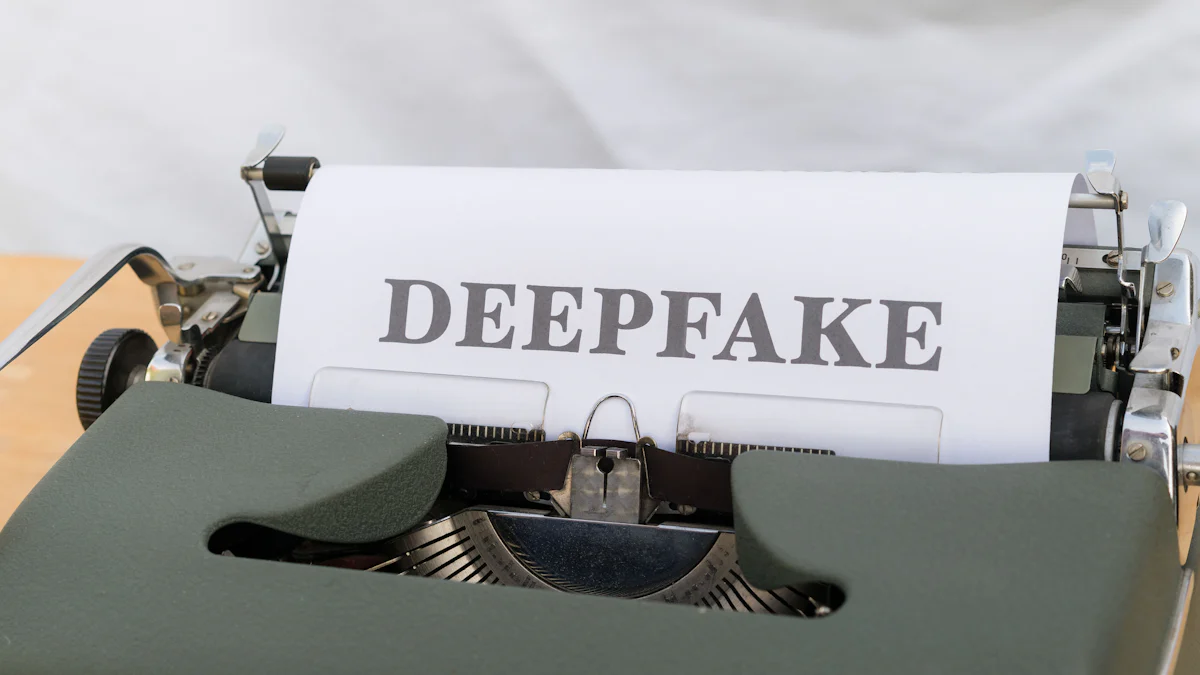Deepfake Porn Generator: Ethical Concerns Unveiled

Deepfake pornography uses artificial intelligence to create realistic fake videos or images. Technological advancements have made deepfake creation accessible to many users. The rise of the deepfake porn generator has led to a staggering 464% increase in production from 2022 to 2023. Deepfake pornography accounts for 98% of all deepfake content online. Aroused.AI, a platform known for AI-generated NSFW storytelling, highlights the ethical concerns surrounding deepfakes. Non-consensual use of images raises significant ethical issues, with 96% of online deepfakes targeting women, impacting privacy and dignity.
Understanding Deepfake Technology

How Deepfakes Are Created
AI and Machine Learning Techniques
Deepfake technology relies heavily on deepfake technology and machine learning. Researchers use Generative Adversarial Networks (GANs) to create deepfakes. GANs consist of two neural networks that compete against each other. One network generates fake content, while the other evaluates its authenticity. This process continues until the generated content appears realistic. The sophistication of GANs has advanced deepfake technology significantly.
Accessibility of Deepfake Tools
User-friendly tools have made deepfake creation accessible to the general public. Many online platforms offer deepfake software for free or at a low cost. These tools often provide step-by-step instructions for users. The accessibility of these tools raises ethical concerns. People can misuse deepfakes for deceitful purposes without technical expertise.
Applications Beyond Pornography
Entertainment and Media
Deepfakes have found applications in the entertainment industry. Filmmakers use deepfakes to create realistic special effects. Actors' faces can be digitally altered to fit different roles. Deepfake technology also allows for the recreation of deceased actors. These applications enhance storytelling in films and television shows.
Political and Social Implications
Deepfakes pose significant risks in political and social contexts. Malicious actors can use deepfakes to spread misinformation. Manipulated videos can influence public opinion and elections. Deepfakes can also damage reputations by creating false narratives. The potential misuse of deepfakes highlights the need for regulation.
Ethical Concerns of Deepfake Pornography
Issues of Consent
Non-consensual Use of Images
Deepfake pornography often involves using images without consent. This misuse violates personal autonomy and dignity. Individuals find their likeness manipulated into explicit content. Such actions lead to severe emotional distress. The lack of consent raises significant ethical concerns. Society must address these issues to protect individuals' rights.
Legal Ramifications
Legal systems struggle to keep up with deepfake technology. Many countries lack specific laws against non-consensual deepfakes. Existing defamation laws offer limited protection. Victims face challenges in seeking justice. Legislation on Deepfake Pornography aims to establish clear standards. New laws could deter the misuse of this technology.
Privacy Violations
Data Security Risks
Deepfake technology poses risks to data security. Malicious actors can access personal images and videos. Unauthorized use of such data leads to privacy breaches. Individuals lose control over their digital identity. Protecting data becomes crucial in the age of deepfakes.
Impact on Personal Lives
Deepfake pornography impacts personal lives profoundly. Victims experience damage to their reputation. Relationships suffer due to false representations. The invasion of privacy affects mental well-being. Society must recognize the long-term effects on individuals.
Psychological Harm
Emotional and Mental Health Effects
Victims of deepfake pornography endure psychological harm. The experience leads to anxiety and depression. Emotional distress affects daily functioning. Support systems become essential for recovery. Awareness of these effects can promote empathy and understanding.
Social Stigmatization
Social stigmatization follows victims of deepfake pornography. Society often blames victims rather than perpetrators. This blame exacerbates feelings of shame and isolation. Education can change perceptions and reduce stigma. Communities must support victims to foster healing and resilience.
Deepfake Porn Generator: Ethical Implications
Consent and Privacy Issues
Breach of Privacy
Deepfake technology poses a significant threat to individual privacy. The deepfake porn generator can create explicit content without the subject's knowledge. This unauthorized use of personal images violates privacy rights. Individuals lose control over their likeness. The breach of privacy can lead to severe reputational damage. Protecting privacy becomes crucial in the digital age.
Non-consensual Exploitation
Non-consensual exploitation remains a major ethical concern with deepfakes. The deepfake porn generator often targets individuals without their consent. This exploitation reduces people to mere objects for others' amusement. Victims experience a loss of dignity and autonomy. Society must address these violations to uphold human rights. Legal frameworks need to evolve to protect individuals from such exploitation.
Psychological and Social Impact
Emotional Distress
The psychological impact of deepfake pornography can be devastating. Victims experience intense emotional distress. Anxiety and depression often follow the discovery of manipulated content. The deepfake porn generator can cause lasting harm to mental health. Support systems play a vital role in helping victims recover. Awareness of these issues can foster empathy and support.
Societal Consequences
Deepfakes have broader societal implications beyond individual harm. The misuse of deepfake porn generators can erode trust in digital media. People may question the authenticity of online content. This skepticism can lead to misinformation and confusion. Society must recognize the potential for deepfakes to disrupt social norms. Education and regulation can help mitigate these consequences.
Introducing Aroused.AI
Features of Aroused.AI
AI-driven NSFW Storytelling
Aroused.AI offers a unique platform that specializes in AI-generated characters. The focus lies on NSFW storytelling content. Users can engage with an immersive experience through text, image, and voice technology. Aroused.AI allows users to request custom images or audio messages from their AI companions. This feature enhances the interaction by adding a personal touch. The integration of photo and audio features elevates AI chat experiences.
User Experience and Customization
Aroused.AI prioritizes user experience and customization. Users can develop digital artwork based on preferred storylines. The platform provides tools for tailoring content to individual interests. This customization ensures a personalized and engaging experience. Users enjoy a seamless interface that simplifies navigation. The focus on user satisfaction sets Aroused.AI apart from other platforms.
Ethical Considerations
Focus on Consent and Creativity
Aroused.AI emphasizes ethical considerations in its operations. The platform prioritizes consent and creativity in content creation. Users have control over the images and audio generated by their AI companions. This approach ensures respect for individual rights and autonomy. Aroused.AI fosters a creative environment where users can explore their interests responsibly.
Differentiation from Unethical Deepfake Uses
Aroused.AI differentiates itself from unethical deepfake uses. The platform adheres to ethical guidelines that protect user privacy. Aroused.AI does not support non-consensual exploitation or misuse of personal data. The commitment to ethical practices builds trust with users. Aroused.AI serves as a model for responsible AI deployment in the digital age.
Regulatory and Legal Measures

Current Laws and Regulations
International Perspectives
Governments worldwide recognize the challenges posed by deepfake technology. China has taken a proactive stance. The country mandates user consent for creating deepfakes. China also requires clear labeling of AI-generated content. These measures aim to protect privacy and maintain transparency. The National Defense Authorization Act (NDAA) in the United States focuses on national security concerns. The act requires a report on deepfake use by international governments. However, the NDAA does not address domestic issues caused by deepfakes.
Challenges in Enforcement
Enforcing deepfake regulations presents significant challenges. Many countries lack specific laws addressing deepfake misuse. Existing legal frameworks struggle to keep pace with technological advancements. Jurisdictional issues arise when deepfakes cross international borders. Victims face difficulties in seeking justice due to these legal gaps. Law enforcement agencies require resources and training to tackle deepfake-related crimes effectively.
Proposed Solutions
Technological Safeguards
Technological safeguards can help mitigate deepfake risks. Developers can implement AI algorithms to detect manipulated content. These tools can identify inconsistencies in audio and video files. Platforms can use watermarking techniques to label AI-generated content. Such measures enhance transparency and accountability. Collaboration between tech companies and governments can lead to effective solutions.
Policy Recommendations
Policymakers must establish clear guidelines for deepfake technology. The Proposed 2024 Defiance Act aims to address non-consensual deepfake creation. This legislation seeks to protect individuals' rights and privacy. Balancing freedom of expression with innovation remains crucial. Governments should consider international cooperation to combat deepfake misuse. Public awareness campaigns can educate citizens about deepfake risks and prevention strategies.
Future of Deepfake Technology
Potential for Positive Use
Innovations in Entertainment
Deepfake technology opens new doors in the entertainment industry. Filmmakers can use deepfakes to create realistic special effects. Actors' faces can be digitally altered to fit different roles. This technology allows for the recreation of historical figures in films. Audiences can experience a more immersive storytelling experience. The potential for creativity in entertainment is vast.
Educational and Training Applications
Deepfakes offer exciting possibilities in education. Teachers can bring historical figures back to life for lessons. Students can engage with interactive exhibitions. Training videos can benefit from enhanced performances through deepfakes. Computer scientists at the University of Bath support this idea. Research encourages further exploration of beneficial applications. Education becomes more engaging and effective with these tools.
Ongoing Ethical Debates
Balancing Innovation and Responsibility
The rise of deepfake technology presents ethical challenges. Society must balance innovation with responsibility. Developers need to consider the impact on privacy and consent. Ethical guidelines can help navigate these concerns. Responsible use ensures that technology benefits everyone. Public awareness plays a crucial role in this balance.
Role of Public Awareness
Public awareness is vital in addressing deepfake issues. People need to understand the potential risks and benefits. Education campaigns can inform citizens about deepfake technology. Awareness helps individuals recognize manipulated content. Society becomes better equipped to handle ethical challenges. Informed citizens contribute to a responsible digital landscape.
Deepfake pornography presents significant ethical challenges. The misuse of AI technology raises concerns about privacy, consent, and psychological harm. Ethical AI practices are essential to prevent negative implications. Companies must ensure ethical policies from AI design to usage. Responsible AI use promotes social good and sustainability. Ongoing dialogue and regulation are crucial for ethical AI deployment. Collaboration among stakeholders fosters transparency and accountability. Public awareness enhances understanding of deepfake risks. Society must prioritize ethical considerations to protect individual rights.
See Also
Unveiling Ethical Dilemmas of AI Generated Avatars
2024's Top 10 Unrestricted NSFW AI Creators
2024's Aroused.ai: Leading NSFW Image Generators
2024's Top 10 Free AI Nude Generator Selections
Discovering Unfiltered NSFW Character AI Platforms like Aroused.ai
